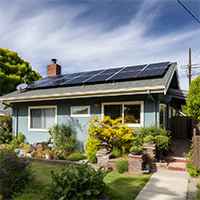Massachusetts solar incentives, tax credits and rebates
Resources for going solar in 2023

Unlike many other states, Massachusetts has a bunch of tax exemptions, tax credits, rebates and loan programs to help make paying for solar much easier.
After tax credits, the average system is $13,377 in Massachusetts, which is cheaper than in many other states. The national average for a solar system is $16,715.
Key insights
- You can take advantage of solar tax breaks, rebates and loan programs in Massachusetts.
- The average federal tax credit value is $5,733 in Massachusetts.
- Massachusetts residents receive an average estimated net savings of $33,013 with solar panels over 25 years.
Solar incentives in Massachusetts
The ITC drops to 26% in 2033 and 22% in 2034.
The federal solar investment tax credit (ITC) is a great way to save money on going solar in Massachusetts. With the ITC, you can get a credit worth 30% of the system’s cost (including equipment, labor and permits) from your federal taxes. For example, in Massachusetts, where a system averages $19,110, residents get an average tax credit of $5,733.
To get the ITC, you need to file federal taxes in the year that your solar panel system becomes operational by filling out Form 5695.
Residential solar incentives in Massachusetts
Massachusetts has many tax breaks, rebates and loan programs for residents who want to install solar panels.
Tax breaks
Massachusetts has several tax breaks to make solar more affordable:
- State income tax credit: Residents qualify for a 15% credit (up to $1,000) for the cost of solar equipment on their state income taxes. The system must be new and “reasonably expected to remain in operation for at least five years,” according to the Database of State Incentives for Renewables & Efficiency, which tracks renewable energy incentives.
- Sales tax exemption: There’s a 100% exemption on sales tax for solar equipment for residential power systems. Fill out Massachusetts Tax Form ST-12 and give it to the vendor at the time of purchase.
- Property tax exemption: Homeowners qualify for a 100% property tax exemption on the value a solar energy system adds to their homes for 20 years. To qualify, you must also have an energy storage system (like a battery).
» MUST-KNOW: The tax benefits of owning a home: must-know deductions and secrets
Rebates
Some of these incentives require you to live in specific regions of the state, so be sure to check if your town is covered.
- The Reading Municipal Light Department (RMLD) offers customers a rebate of $1,200 per kilowatt (kW).
- The town of Wakefield has a rebate of $1.20 per watt for solar systems up to 10 kW.
- Concord Municipal Light Plant has a rebate program to offset up to $3,125 of your electric bill if you have a solar system.
- The TMLP solar rebate program in Taunton has a rebate of $1.50 per watt on solar installations (up to $4,500), a $1.20-per-watt rebate (up to 50%) and $300 for solar batteries.
- Hudson Light & Power offers customers a rebate of $1.20 per watt (up to $7,500) for systems with up to a 25-kW capacity.
- Shrewsbury Electric & Cable Operations (SELCO) offers a solar rebate of 10 cents per watt up to $1,000.
- The Ipswich Electric Light Department offers rebates of 30 cents per watt (up to $3,000) on solar systems.
- The Solar Massachusetts Renewable Target (SMART) program provides up to 17 cents per kilowatt-hour (kWh) for electricity statewide.
Loan programs
Need financing? Several solar loans are offered in Massachusetts:
- Holyoke Gas & Electric’s Residential Energy Conservation Program (RECP) has solar loans of up to $10,000 for citizens of Holyoke.
- The Mass Save program has zero-interest loans of up to $25,000 for Liberty Utilities, Cape Light Compact, National Grid, Eversource and Unitil customers.
- The Property-Assessed Clean Energy (PACE) program helps you finance solar with a fixed-rate loan paid back through a fee added to your property taxes.
What to know about net metering in Massachusetts
Net metering is the process of selling excess electricity made by your solar panels to the power grid. While many people store their extra power in solar batteries, some opt for net metering to help offset their electric bill. As part of the state’s net metering rules, new solar customers get net metering credits equal to 60% of their net excess kilowatt-hours.
It’s a great deal for residents, but there are occasional hiccups, as Peter in Weymouth found out.
“My system is doing great,” Peter said. “But I was still getting full electric bills from my electric provider.” His solar company arranged for an electrician to change his electric meter over to a net metering unit. “But the meter that they put in was another standard meter. So, I lost over two months’ worth of solar energy.”
He had to work with the service provider to get it back. “The electric company came out and changed my meter again and put on the correct meter. So going forward, it should work,” he said.
You can also take advantage of the solar renewable energy certificate (SREC) program. For example, Ronald in Groton installed 32 solar panels on his roof in Lincoln. “They were paid off in four years, and since then I have received an average of $2,400 per year in SREC payments,” he said.
» GREENEST STATES: Massachusetts ranks No. 13
Solar resources in Massachusetts
Below are additional resources that can guide you through transitioning to solar in Massachusetts.
- Massachusetts net metering guide
- Massachusetts solar information and programs
- Solar Massachusetts Renewable Target (SMART) Program
- Solar power guide for energy savings in Massachusetts
- Massachusetts Clean Energy Center - solar electricity
- Massachusetts Division of Local Services
» GUIDE: Solar panel installation guide
Find solar companies in Massachusetts
Compare popular solar companies available in Massachusetts below. Read our guide to finding the best solar companies for more.
| SunPower | ShopSolar | Palmetto Solar | Sunrun | |||
|---|---|---|---|---|---|---|
| Primary | Get quote | Customer Ratings 4.3 | Free quote | Payment options
Cash, loan, lease
| Warranty
10 to 25 years
| |
| Primary |  | Get quote | Customer Ratings 4.7 | Free quote | Payment options
Cash, loan
| Warranty
Varies
|
| Primary | Get quote | Customer Ratings 3.7 | Free quote | Payment options
Cash, lease, loan or PPA
| Warranty
25 years (product and performance)
| |
| Primary |  | Get quote | Customer Ratings 4.1 | Free quote | Payment options
Cash, loan, lease
| Warranty
25 years
|
FAQ
Can I get solar panels for free in Massachusetts?
You can lease or enter a PPA in Massachusetts with little to no upfront costs. There isn’t a program for free solar panels in the state, though.
» FREE SOLAR PANELS: Are they really free?
How much can I save with solar panels in Massachusetts?
In Massachusetts, the average savings when you go solar is $33,013 over 25 years. Even if you don’t generate 100% of your energy needs, you can still save a lot of money versus with traditional utility bills.
» MORE: Solar energy pros and cons
Is my HOA allowed to restrict solar panels?
HOAs are not legally allowed to prevent you from putting solar on your home in Massachusetts.
Does Massachusetts have any corporate solar incentives?
Yes. There is an excise tax exemption and an excise tax deduction. Massachusetts also has an alternative energy and energy conservation patent income tax deduction for corporations.
» MORE: Commercial solar panels
How can I pay for solar panels?
While it’s possible to pay for solar panels upfront, many people opt for financing options to make solar more accessible. Solar loans operate similarly to other types of loans, involving an application and approval process; you repay the loan gradually over time, usually with interest.
» SOLAR PANELS: Lease vs. buy
Bottom line: How much are solar panels in Massachusetts?
The ConsumerAffairs Research Team conducted an in-depth analysis to determine how much it costs to go solar in Massachusetts and the average solar costs in other states.
In Massachusetts, after factoring in the federal solar tax credit, the average solar system costs $13,377. The Bay State provides a range of tax exemptions, tax credits, rebates and loan programs to simplify the process of financing solar installations, making going solar an accessible option for residents.
Solar costs: Massachusetts vs. nearby states
| Average cost per watt | Typical system size | Upfront cost* | ITC value (30%) | Payback period** | Estimated net savings | |
|---|---|---|---|---|---|---|
| Massachusetts | $2.94 | 6.5 kW | $19,110 | $5,733 | 8 years | $33,013 |
| Connecticut | $2.80 | 7.5 kW | $21,000 | $6,300 | 8 years | $42,705 |
| Rhode Island | $2.84 | 6 kW | $17,040 | $5,112 | 8 years | $34,519 |
| New York | $2.94 | 6.5 kW | $19,183 | $5,760 | 10 years | $24,387 |
| New Hampshire | $2.91 | 6.5 kW | $18,916 | $5,675 | 9 years | $28,409 |
Article sources
- DSIRE, “ Massachusetts Solar Programs .” Accessed Sept. 13, 2023.
- Commonwealth of Massachusetts, “ 830 CMR 62.6.1: Residential Energy Credit .” Accessed Sept. 13, 2023.
- Commonwealth of Massachusetts, “ Sales and Use Tax .” Accessed Sept. 13, 2023.
- Commonwealth of Massachusetts, “ Solar Carve-out and Solar Carve-out II Program Information .” Accessed Sept. 13, 2023.
- Solar Energy Industries Association, “ Massachusetts Solar .” Accessed Sept. 13, 2023.
- EcoWatch, “ Solar Panel Cost in Massachusetts .” Accessed Sept. 13, 2023.
- Homeowners Protection Bureau. “ Massachusetts HOA Laws and Resources .” Accessed Sept. 13, 2023.
- Environmental Protection Agency, “ Summary of Inflation Reduction Act provisions related to renewable energy .” Accessed Sept. 13, 2023.
You’re signed up
We’ll start sending you the news you need delivered straight to you. We value your privacy. Unsubscribe easily.
